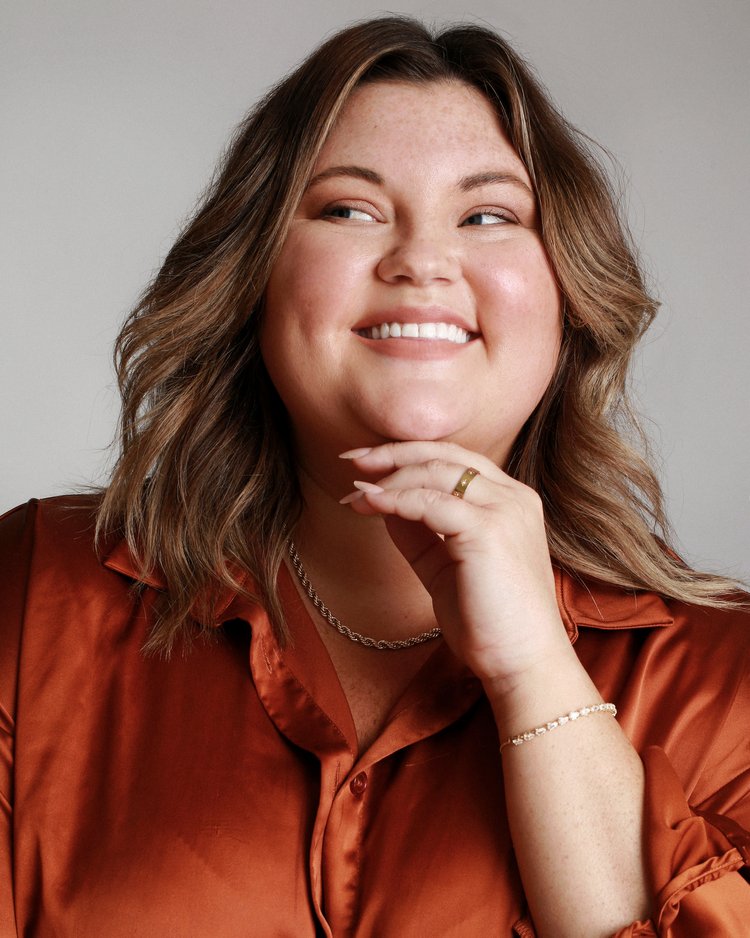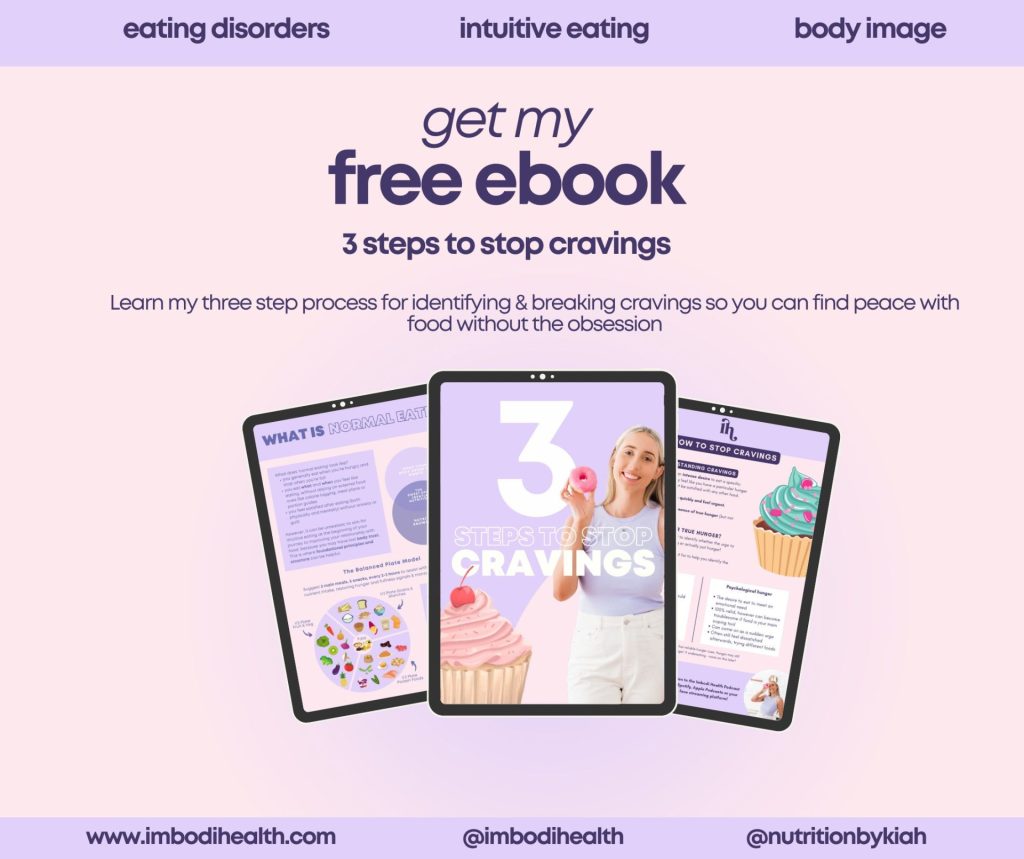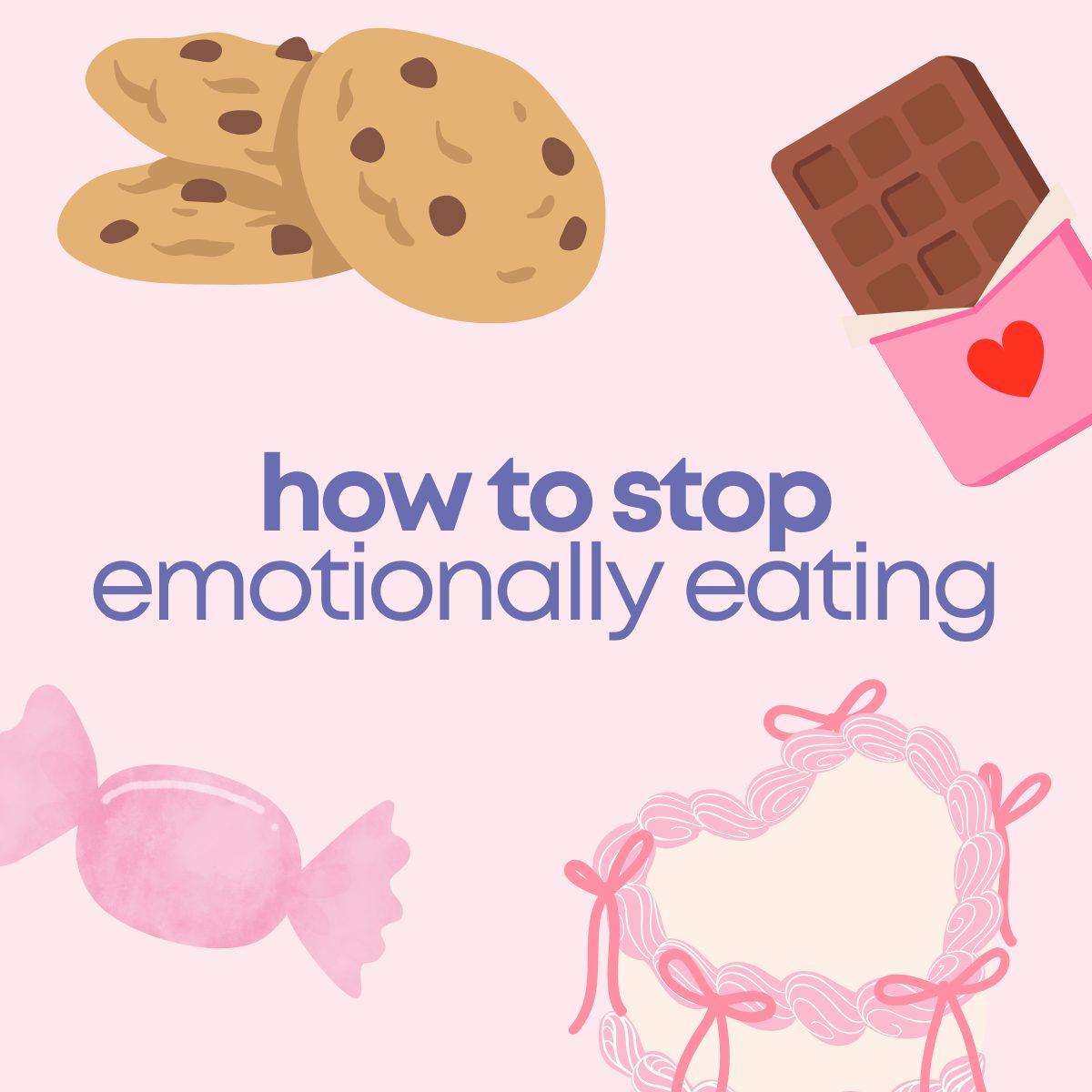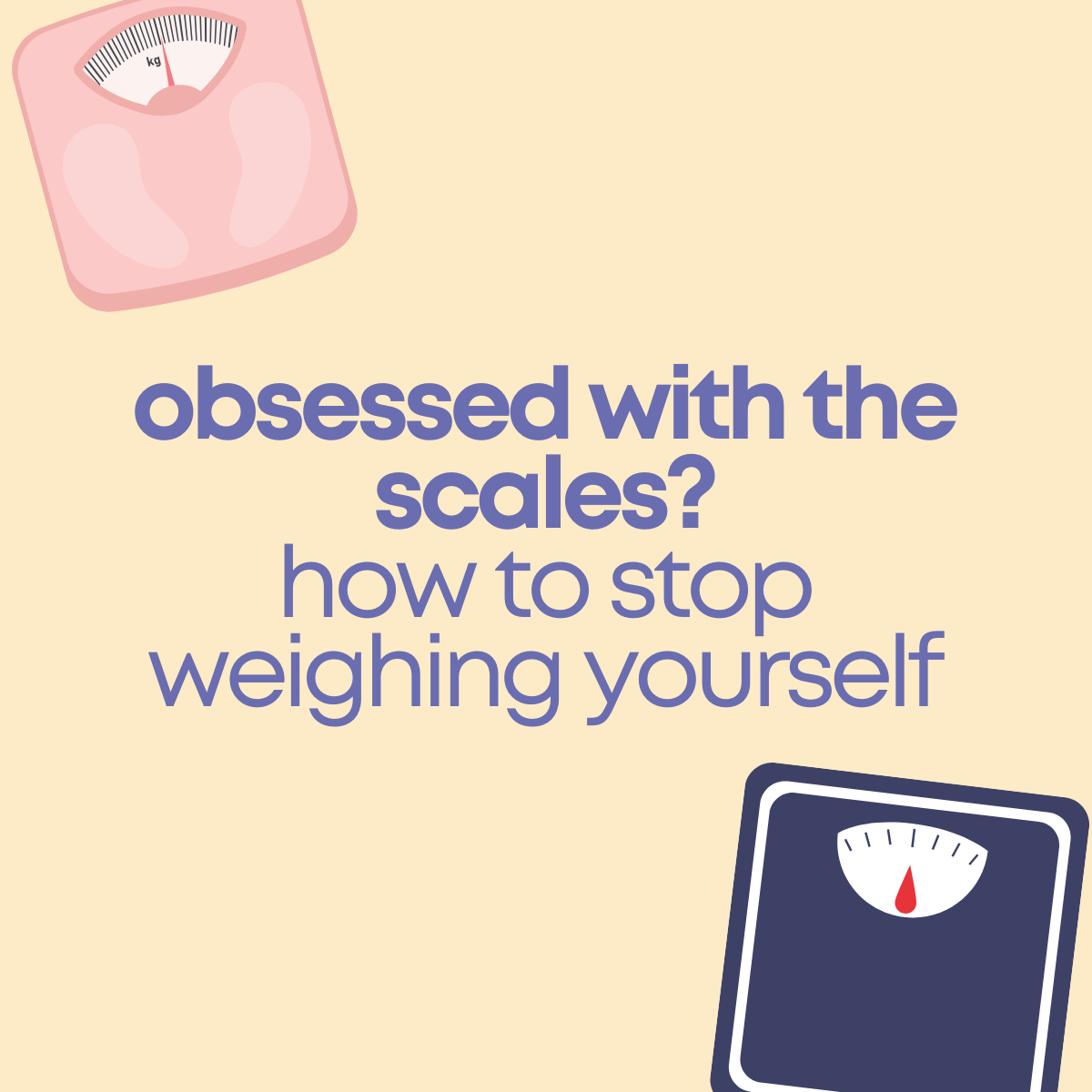Carly is an eating disorder survivor turned eating disorder therapist.
Her lived experience has led her to work with individuals all over the world, helping them give up dieting, recover from disordered eating or an eating disorder, and find genuine happiness and acceptance within themselves, no matter their size, race, gender, sexuality, or socioeconomic status.
She’s also the host of the “Recover with Carly” podcast and the creator of an eating disorder education and awareness curriculum for adolescents.
Carly combines her professional practice with public speaking, social media, and modelling to embody the example she wishes she had growing up.
Join us as we chat with Carly about her recovery journey, and ways to navigate body comparison and challenging body image days.
Carly’s Recovery Journey
Growing up, I was always the chubby little girl, bigger than my friends.
I remember around middle school – noticing my body looked different from my friends’. When we went shopping, their experiences were very different from mine.
They found clothes that fit well and looked cute, whereas I struggled to find clothes that fit me nicely, were cute, and matched the styles my friends wore. That’s when I started becoming aware of body comparison, and that my body was different to those around me.
As I got older, I faced bullying in middle school where people would comment on my body. One specific incident stands out – a classmate called me fat in front of the entire class. I laughed it off because humor was my coping mechanism. I’d make people laugh before they could laugh at me. Looking back, I wondered why none of my friends or classmates spoke up and said something like, “Hey, that wasn’t cool” or “You shouldn’t say that.” No one did, and that was eye-opening for me.
I talked to the school counselor about it, my first time seeing one, but it wasn’t a good experience. She dismissed my feelings, saying, “They’re just kids; they didn’t mean it.”
That was a huge turning point for me. It made me realise not only did my classmates see my body as different or bad, but adults did too. I felt invalidated and that really impacted my relationship with my body. From there, I tried every diet under the sun to lose weight, but nothing worked. Unfortunately, this led to developing an eating disorder.
I thought it would be a short-term thing, maybe a couple of weeks to lose weight, then I’d keep it off. But eating disorders don’t work like that. They become long-term struggles.
I started my recovery around junior year of college when I began noticing physical symptoms from my eating disorder. That scared me because before that, it felt like nothing was happening to my body. It was just a day-to-day thing. When physical symptoms showed up, it became real. That was my turning point to start recovery, a journey that’s been ongoing with lots of work every day.
What Helped Most During Recovery
Around that time, I was more active on social media and able to connect with people who had recovered or were in recovery. Hearing from them, having conversations about understanding their feelings and how recovery was the best decision for them really helped.
Starting my platform on social media around that time and talking about health and wellness internally made me feel like a hypocrite. I wondered, “Why do I have the right to come on here and talk about how to be healthy, how to love yourself, and do all these things when I’m engaging in eating disorder behaviours?”
That was a big thing for me. I didn’t want to be known as a hypocrite. Being genuine was important to me.
It was important for me to realise that although I may not feel like I deserve this, I was telling all these people that they did deserve this. It was important for me to realise that I also deserve this – and I couldn’t preach one thing and live in a completely opposite way.
Understanding that some days will feel harder was one of the best things I could have done for myself. It’s easy to get stuck in people-pleasing or perfectionism phases and to struggle to show those hard days or difficult days because you don’t want people to know you’re struggling, or be worried about you.
We don’t have to hide those things. There’s no shame in having days when we don’t want to get out of bed or just want to lay on the couch and watch TV. Overcoming any shame associated with that has been helpful for me. It’s allowing myself to show up in whatever space I’m in or choosing not to show up one day and knowing that’s a boundary I’m allowed to set.
Get your free copy of my 3 Steps To Stop Cravings eBook here!
Navigating Conversations Around The Scales
I recently had a reel go viral where I shared almost like a script that people could use at the doctor if they either didn’t want to see their weight or didn’t want to be weighed. Initially, it was amazing within the first week or so of the reel being up. Then it hit the wrong side of Instagram, and all the trolls, every single fat-phobic person online seemed to comment on this reel.
I feel like there’s this expectation for content creators to ignore these comments or delete them and not acknowledge them. But for me, there’s an important educational aspect to it. Taking the opportunity to educate someone leaving a comment like that, whether they choose to take the knowledge or education and do something with it, is really important for me.
I ended up limiting my comments to only my followers because trolls were copy-pasting the same comment over and over, which wasn’t productive. Navigating that, it’s important to have boundaries, even offline, with people who feel the need to say things that hurt you. Sharing that they hurt you is important in everyday life.
Navigating Conversations Around The Scales With Healthcare Professionals
One thing I’ve learned from many conversations with nurses, doctors, and other medical professionals is that in most medical settings, they don’t necessarily need your weight. Certain scenarios may require it, like medication dosage or specific medical reasons. But for routine visits or check-ups, there’s usually no need.
What I found empowering is requesting a blind weigh-in, turning my back, or simply declining to be weighed. Some doctors may insist on weighing you, so asking for a blind weigh-in is an option.
Others may acknowledge that weighing isn’t necessary for that visit. When we advocate for ourselves in this way, it can surprise nurses and doctors because they’re not used to it.
People might fear being questioned by healthcare providers about why they don’t want to be weighed or why they don’t want to know their weight. One thing I always emphasise is that you don’t have to give a detailed explanation. You can simply say, “For personal reasons, I prefer not to be weighed or see my weight.”
In my reel, I mentioned how it’s important to bring this up multiple times during your visit. Once, I mentioned it to the nurse who took me back to the room, who would have weighed me. Then another nurse came in for blood pressure and other checks, and I had to repeat my request. The doctor came in, and I had to remind them as well.
Using weight to judge someone’s overall health based solely on BMI is deeply flawed. Unfortunately, some people go to the doctor for one issue, like a broken finger or a sprained ankle, and immediately face comments about their weight.
It can be intimidating, but having these conversations and empowering people to advocate for themselves is crucial. Educating yourself on BMI’s realities, being in tune with your body, and understanding that how you feel is more important than a number on a scale are all essential aspects of navigating these situations.
Navigating Body Comparison On Social Media And The Media
There are a few important things I like to that about when discussing body comparison – some of the most important points are around self-acceptance and curating your environment:
View this post on Instagram
You’re Unique
One thing I always tell people struggling with body comparison is that you are the only version of yourself in the entire world. There’s literally not another version of you, and that’s a special thing to embrace.
What was life-changing for me was realising I didn’t want to be on my deathbed looking back with regret, trying to be or look like someone I’m not. I didn’t want to waste this vessel on meeting societal standards.
Embrace who you are because there’s no one else like you. No one has the exact pattern of stretch marks or cellulite that you do—it’s all individual and beautiful.
Curate Your Gallery
Also, follow people who make you feel good about yourself. I often tell adolescent clients struggling with body image and body comparison to evaluate who they follow online. If they’re following accounts that make them feel like they need to change, we work together to unfollow those and follow ones that empower them, where they feel good and leave feeling empowered, not worse about their bodies.
Think of your social media as an art gallery—you’re the curator choosing what’s shown. Instagram is curated; you can choose what art is in your gallery, highlight artists you love, remove, mute, or block others.
Visualise what you want your gallery to represent—body liberation, social justice, animals—curate what you’re taking in.
Overcoming Distressing Body Image Days
Be Kind To Yourself
The biggest thing is giving yourself grace. Understanding that just because you have a bad body image day, doesn’t mean that all the work you’ve put into healing your relationship with your body has gone to waste.
If you find you’re spending the whole day doom scrolling and engaging in body comparison, you’re not a failure on this journey. It doesn’t mean you’re starting over at square one, it just means that you’re having a day that feels a little bit more difficult to navigate. And you’re maybe a little more dysregulated than normal, or maybe you’re a little hungrier than normal, or a little more tired than normal.
There are all these different factors that play a role in that. And I think that allowing yourself to just feel what you’re feeling on those days, without trying to hide it or feel shame about it, is a really great way to navigate it.
Build Your Toolkit
Having your go-to coping skills is important. This could look like taking extra time to do something that honours your body and who you are.
It could mean sitting on the floor, hugging yourself, closing your eyes, and speaking kindly to yourself. Or, it might mean calling a friend or family member and saying, “Today’s really tough. Can you listen while I vent?” Having someone to share those feelings with is invaluable; it’s comforting to know you’re not navigating it alone.
Writing down your coping skills and referring to that list on tough days can help. Ask yourself, “What feels doable right now? What might be helpful?” Whether it’s sitting in the sun, going for a walk, journaling, or listening to a podcast, allowing yourself to feel and do what brings you joy is key.
It’s important to remember that what works one day might not work the next. It’s okay if it’s a bit of a roller coaster; progress is never linear.
View this post on Instagram
Seek Support
It’s okay to not be okay. It’s okay to have those days where we just don’t feel okay. I think having those support systems to turn to on those days is the most important.
This could be a family or friend, a therapist, your eating disorder dietitian, or whoever you happen to be working with in your team. They can provide support in the earlier days if you’re a little bit too shy or afraid to share with other people around you.
Your Body Is The Least Interesting Thing About You
My one key takeaway for any parents who are listening: Be aware of the way you talk about your body and other people’s bodies around your kids, and the way you talk about food. This can plant the seed for body comparison from a young age, and can be dangerous.
A big part of my struggle was growing up hearing my mom speak so negatively about herself. She never spoke negatively about me, but I always heard her talk about herself. That ingrained messages in me that, as women, we’re always meant to be trying to shrink ourselves, always supposed to be on a diet. Body comparison is at the core of this.
At the end of the day, your body is the least interesting thing about you. You have so many other amazing characteristics and contributions to make to the world.
Trying to shrink yourself and change your body constantly takes away from these beautiful experiences you could have.
Remember that your worth is not defined by the size of your body. There is space for you, no matter your body size. You deserve to take up that space, celebrate who you are, and what your body can do for you every single day without feeling the need to paint it or talk negatively about it.
I know it might seem easier said than done, but consistency and re-implementing that message into your head daily will help you get to the point where it feels easier to say that.
Where you can find Carly:
Website: www.recoverwithcarly.com
Instagram: @recoverwithcarly
TikTok: @recoverwithcarly
Podcast: Recover with Carly





Comments +